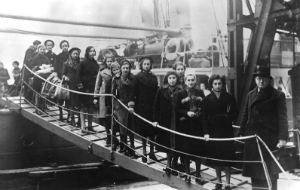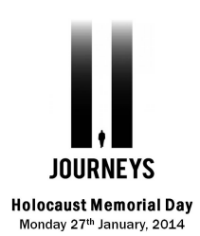The voice of rescue - the experience of the Kinder refugees
The UK gave refuge to 10,000 predominantly Jewish children in the lead up to World War II. On Holocaust Memorial Day Stephanie Cottam looks at their journeys, what they gained, what they lost. Are there parallels to Syria today?
The Kinder-Journey
The theme for this year’s Holocaust Memorial Day (27 January) is
Journeys, as determined by the
Holocaust Memorial Day Trust. From 1935,
 |
Kinder children of Polish Jews arrive in London in February 1939: Wikimedia Commons
|
when the
Nuremberg Laws were instigated, more than six million Jews made a fearsome final journey into one of the Nazi extermination camps. Less understood are the millions of Jewish people who escaped Nazi-Europe until it became too difficult to travel.
This includes the 10,000 children who were pulled out of Nazi-Europe by the
Kindertransport (1) rescue programme between 1938 and 1940. It involved an arduous journey made without their parents, often alone, to a great unknown in a foreign country. Many of the children who made this particular journey, including well-known author Lance Lambert, were not guaranteed safety at the other end. Most of them never saw their parents or older siblings again.
As writer Vera Gissing recalls, quoted in The Telegraph in May 2013, 'The scene at Prague station will be with me forever. The forced cheerfulness of my parents – their last words of love, encouragement and advice. Until that moment, I felt more excited than afraid, but when the whistle blew and the train pulled slowly out of the station, my beloved mother and father could no longer mask their anguish.'
Following a night of terror known as
Kristallnacht (Night of the broken glass), the British Government led by Neville Chamberlain was challenged by the British Jewry Refugee Committee and high-ranking Christians to be more pro-active and help rescue the most ‘at risk’ children from Nazi Germany.
A debate was hastily arranged in the House of Commons and it was agreed to waive the immigration laws and grant temporary access to Jewish children from Nazi Europe, Germany, Poland, Czechoslovakia and Austria into the UK. The visas were only to be ‘temporary’ because everyone fully expected the children would return home and rejoin their families once the war was over.
Following an appeal, many British people opened their homes to foster the refugee children and around half of the 10,000 refugees were placed within British family homes. The rest of the refugee children were sent to live in hastily arranged hostels, summer camps and boarding schools, in an attempt to provide a home-life for the escapees.
The first group of 200 Kinder-refugee children arrived in Harwich on 2 December, 1938. They were from a Jewish orphanage in Berlin which had been completely destroyed during Kristallnacht. The children were dispersed throughout the UK, and became assimilated into the everyday life of the family or group they were placed with.
Those refugee children over 14, who weren’t placed with individual families, became part of the British labour force mainly within agriculture or domestic service. The US followed suit, also arranging a rescue programme of child victims of Hitler’s reign of terror.

John Fieldsend, former Director of
CMJ UK (1988-1998), was one of the Kinder children who came to the UK from Czechoslovakia in 1939 with his brother. He remembers, 'My parents and most of the rest of my family were not granted visas... and so had to stay behind and perish in Hitler’s camps. As it came time to leave, [mother] took off her wristwatch and gave it to us. For us it was a mixture of fear and adventure – we didn’t really understand.'
When they arrived in England, John and his brother were separated from each other, as many foster families could only accommodate one child.
So children were separated from their families, in the hope for a future life. Many of them had no idea what was happening, being too young to comprehend why their parents were sending them away, or whose parents didn’t (couldn’t?) actually explain to them what was going on, in the misconceived attempt to stop them from worrying or being afraid. Heartbreaking scenes at their front doors, the docks or train stations were to be the last memory most of the kinder children would have of their parents.
'When I left Nazi Germany with the Kindertransport of February 8, 1939, I was heartbroken that I had to leave my entire family behind. I was 16 at the time, spoke very little English, and at first stayed with a family...near Dorchester in Dorset. Four weeks later I joined Bryanston College, near Blandford, where I gradually picked up enough English to pass oral tests and written examinations.' Paul Kuttner, Kinder-refugee
'On 12 April, 1940, a lady from a refugee care committee took my sisters and me to the pier of Antwerp where we boarded the SS Westernland for our trip to the US. My father met us at Southampton and, since WWII had started, the ship dodged floating mines.' Harry W. Ebert, Kinder-refugee
When they arrived in the UK, some of the children faced suspicion and alienation from the communities in which they were placed. During early 1940, around 1,000 Kinder refugee boys, over the age of 16, were now considered ‘enemy aliens’ if they weren’t employed in the British army. They were interned in hastily erected camps around Britain, before being sent to the Isle of Man, or deported to Canada and Australia, for fear they may be spies or help the German army if they invaded.
Not necessarily treated in the same way as prisoners of war, the interns’ loss of freedom, loss of work, and lack of activity caused an outcry in Parliament: the Jewish refugees were the most unlikely group of people to aid Britain’s German enemy, having once escaped the atrocities of Hitler’s hate-filled campaign against them. Within a year, most of the Jewish-refugees had been released.
'On the way from Lancashire to the Isle of man, a Nazi dive-bomber – a Stuka – attacked our ship. Mercifully its bombs hit the water, not our vessel, into which we were locked into the interior without access to the outside. Although our stay on the Isle of Man was pleasant... all of us prayed for an early release. In fact the situation in the Lancashire wool factory was more frightening since we refugee boys shared the filthy old wool plant with captives who happened to be POWs from a German U-boat.' Paul Kuttner, Kinder-refugee
These journeys of the Kinder Holocaust survivors, alongside the countless stories of people who risked their lives finding their own way of escape out of Nazi-Europe (including my own grandfather), offer hope that for all the thousands of people who silently allowed the worst atrocity of our modern history to occur, there were pockets of people who could not and would not remain idle. There are great testimonies of people who put their own lives in jeopardy for the sake of the Jewish people, and set about rescuing as many as they could, in order that somehow, a remnant of Ashkenazi (European) Jews would survive the onslaught of bitter hatred for their existence.
During the debate in the House of Commons, in 1938, British Foreign Minister, Samuel Hoare made one of the persuading statements of the discussion, 'Here is a chance of taking the young generation of a great people, here is a chance of mitigating to some extend the terrible suffering of their parents and their friends.'
As we reflect on our past, we can’t help but notice the echoes through time for those caught up in today’s situation in Syria, where refugees are once again being displaced. As many churches join synagogues in lighting a candle of remembrance, let’s look at our present, as well as on our past.
The question we have to ask ourselves in 2014 is whether the future could ever be a witness to this kind of event again, against the Jewish people, who remain at the heart of the Bible, and among whom Jesus was born. We would hope not, but the truth is that anger, hatred and bitterness against them remain as strong in many areas of the world as they were in the person of Hitler. The man may be long-dead... but the spirit behind him remains.
May the Lord have mercy on His people.
May we be like the pockets of people who refused to be silent in the face of the Holocaust.
May we be the voice of rescue.
May we be the voice of God’s peace.
Stephanie Cottam is the conference and website manager for CMJ-UK. She also writes and edits a girls magazine for Christian teens, called SHINE. She blogs and is the author of Ready or Not - He is Coming
1 The Kindertransport Rescue programme saved only 10,000 children. This is a drop in the ocean compared to the 1.5 miliion children who perished in Hitler’s concentration camps, but there are 10,000 families who were offered the hope of a future, to continue family genealogies, and to keep their family stories alive.
Baptist Times, 23/01/2014